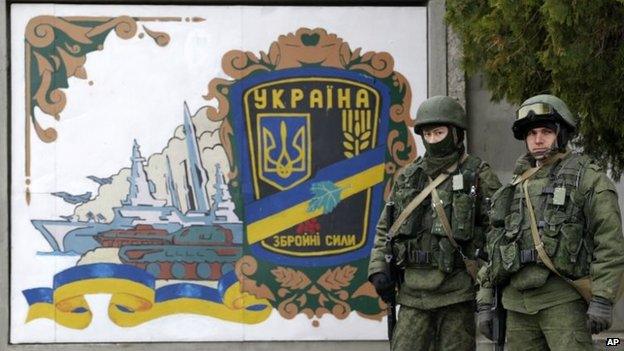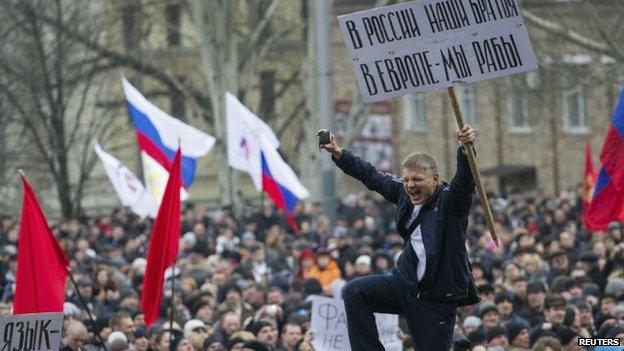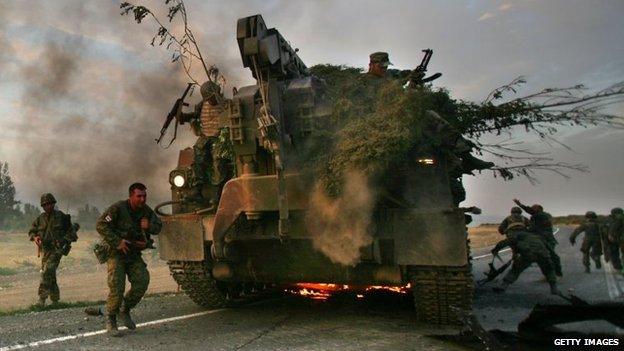Ukraine crisis: What next for both sides?
- Published

The deployment of Russian troops and unidentified gunmen in Crimea has ratcheted up the crisis
The wider picture could hardly be more serious.
On Saturday President Vladimir Putin moved to get parliamentary permission to use Russian troops not just in Crimea, but in Ukraine as a whole. This takes this crisis to a disturbing new level.
Russian diplomats say he may not use those powers "immediately" - but that does seem to imply they may be used before long.
President Putin has said he will do what is necessary to "protect Russian citizens and compatriots". Already there are disturbances in towns in eastern Ukraine.
And Russian troops are on combat alert on the border, as part of the massive training exercise being carried out this week.
'Neo-fascist coup'
Both Russia and the West say they want a peaceful resolution, but they are at polar opposites on the fundamental question of who is the legitimate authority in Ukraine.
Western powers say it is the new interim government in Kiev, authorised by the Ukrainian parliament.
Russia says Kiev is in the hands of an illegitimate government of "far-right extremists" with "xenophobic, anti-Semitic and neo-fascist" views, installed as the result of a "coup d'etat", which deposed President Victor Yanukovych illegally.
Mr Putin wants the West and Kiev to go back to the defunct agreement signed with Victor Yanukovych on 21 February to hold discussions about constitutional reform to satisfy the demands of all parties and regions - presumably shorthand for reforms to turn Ukraine into a federation, with more self-rule for Russian-speaking regions and Crimea.
But that would effectively mean recognising that Mr Yanukovych is still president and that the new Ukrainian government is therefore illegitimate.
The West is not going to agree to that.

The east of Ukraine is more broadly pro-Russian - but there are no neat divisions
The conflict is on a knife edge. The deployment of Russian troops in Crimea has not yet led to bloodshed.
But if that widens into a Russian military intervention into other parts of Ukraine, it is hard to see how violent clashes could be avoided.
Appeal for help
Eastern Ukraine is not a separate geographical entity like Crimea. There is no easy way to define where Russian-speaking regions end and Ukrainian-speaking parts of the country begin.
The Kiev authorities have so far shown maximum restraint - but for how much longer?
As for Russia's intentions, President Putin showed in Georgia in 2008 that he is fully prepared to go to war. And Ukraine matters to him much more.
Kiev has appealed for outside help. But the fact is that the West's options look limited. Nato is convening emergency meetings. EU foreign ministers meet in emergency session on Monday.
The US has already accused Russia of invading Ukraine and violating the UN charter.

The current crisis has brought back memories of the conflict between Russia and Georgia in 2008
US Secretary of State John Kerry has warned that unless Russia took immediate and concrete steps to withdraw, the effect on US-Russia relations and on Russia's international standing would be profound.
But how might the West respond? There must surely be little appetite for Nato to react militarily.
Possibly, it might take steps to secure the Polish-Ukrainian border. More likely the West would look to take diplomatic and economic measures to isolate Russia and suspend co-operation with it.
But even if the West did impose sanctions or other measures, President Putin may gauge that - as with Georgia - it would not last.
In a year or two, Western governments would change and new leaders would repair relations with Moscow, recognising that Russia is too powerful and dangerous, and too crucial to international stability to have as an enemy for long.
Think no further than the impact a new East-West hostility would have on the Iran nuclear talks, the war in Syria, or the precarious uncertainty over North Korea.
High stakes
In any case would, say, Iran-style sanctions even be an option? Possibly Russia is too intertwined economically with Western partners, especially in Europe.
After all, Russia could always in theory retaliate with the Gazprom card - Europe's reliance on Russian gas makes it vulnerable.
What is so dangerous about this confrontation is that unlike Georgia in 2008, the stakes are so much higher on both sides.
For Western powers, this is not just about standing up for a small country in the far-off Caucasus. It is a military crisis taking place on Europe and Nato's border.
For President Putin, this is not just a geopolitical battle for influence over a country in Russia's backyard. It is to protect land which for him is, historically and culturally, an essential part of the idea of Russia.
Kievan Rus was where, over 1,000 years ago, the Russian state and the Russian Orthodox faith began. That is why he will do his utmost not to let it go, whatever the cost.
In Georgia, the Tbilisi government lost South Ossetia and Abkhazia when they were occupied by Russian troops - supporting pro-Russian separatists - and de facto annexed by Moscow.
Though unrecognised as separate new countries by most of the rest of the world, the two territories have effectively moved from Georgia to Russia's control. UN talks to try to resolve the dispute have got nowhere.
So in Ukraine is that what Russia intends to do too? Take Crimea and Russian speaking regions under its control, effectively dividing Ukraine in half?